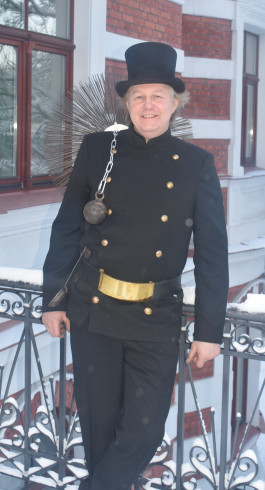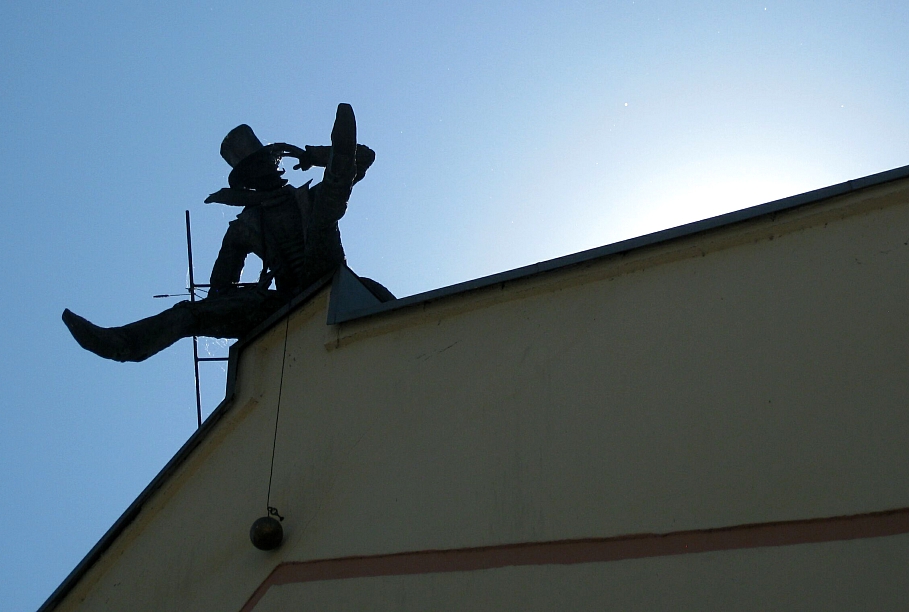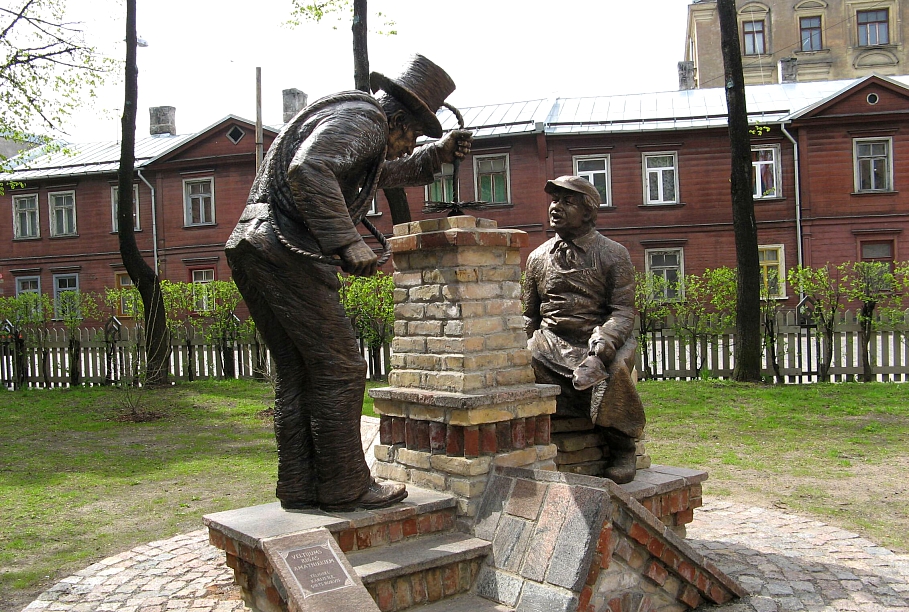These days, few young people choose a career involving clambering on rooves and prising soot off bricks. But despite having other options, that’s exactly what Vilnis Daņiļevičs happily does from Monday to Friday.
As a young man, Vilnis followed his heart and studied to be music teacher. Indeed, for the last 20 years, he has played the organ every Sunday in Turaida Lutheran Church. But then he became apprenticed to his chimney sweep father and has no regrets about following in dad’s footsteps.
“You get to travel around and meet people and see something new, rather than sitting in an office shuffling paper,” he says. “It’s interesting, creative work.”
In earlier centuries, fires were a terrible hazard in densely built-up towns. So, the men who had the power to prevent them were held in high esteem.
In 1738, the Brotherhood of Chimney Sweeps was founded in Riga, as part of the guild system which had organised economic life since medieval times. The job continued under all the regimes that followed and surprisingly, many things about it haven’t changed since three centuries ago.
After Latvia regained its independence in 1991, the Brotherhood was re-established. Today, it once again runs a traditional apprenticeship system whereby youngsters learn the trade from experienced masters rather than in a classroom.

In the late Soviet period, Vilnis’ dad was a chimney sweep attached to the fire department in Sigulda. He occasionally asked his son to help out, and gradually taught him the ropes. As age caught up with Daņiļevičš senior, Vilnis gradually took over the work on the roof, and eventually inherited the business.
Along, the way, he also acquired an education in bricklaying from an old Latvian potter, who taught him to build fireplaces and tiled stoves from scratch, even gathering the right clay to make bricks.
Vilnis says he isn’t scared of heights, but there have been dicey situations. Once, a client had just installed a new ladder to access the chimney of his house. Assured by the homeowner that all was well, Vilnis began climbing, when the hooks at the top of the ladder suddenly came loose, sending him sliding down the tiles. Fortunately, it was only a one-storey building, and landing on a car broke the fall halfway, but it drove home the lesson of never taking anything for granted.
Being thorough saves other people’s lives too. If soot and other debris cause a fire inside a chimney, the draft can raise the temperature to 900 degrees Celsius, destroying the house in a matter of minutes. So, folks realise its cheaper to regularly get the chimney sweep in.
These days, you won’t see much smoke in bigger cities, as most buildings now use other forms of heating. But Latvia’s chimney sweeps are keeping up with technology, inspecting and servicing gas and wood pellet boilers and ventilation systems.

The community spirit of the Brotherhood is charmingly timeless. Its roughly 80 members (including one woman, who also learned the trade from her father), enjoy annual rafting trips on the Gauja River with their families and other get-togethers.
“They really are like brothers,” says Vilnis’ wife Skaidrīte. “They make sure their friends don’t drink too much, that they are good family men and have other interests in life apart from just making money.”
The best form of advertising is word of mouth, and many households on Vilnis’ beat, centred around his hometown of Cēsis and Sigulda, have stayed with the Daņiļevičs clan from generation to generation. If they aren’t home, people just leave the door open and the money on the table,
“They know me, and I know them, and I always do the best I can, so there aren’t any problems,” he says.
Vilnis makes no bones about the fact that it is a dirty job. If the outside temperature is +30, it can reach 40-50 degrees up in an attic. To cool off, one summer evening he went to a lake for a swim, and after stripping down, his blackened face and hands caused a nearby fisherman to ask if he’d had an accident.
Perhaps to compensate, chimneysweeps pay great attention to their appearance after hours. They have a dress uniform featuring traditional tools, a top hat and shiny brass buttons, which strangers in Latvia love to come up and touch.
“The buttons symbolize good luck,” Vilnis explains. “If you make a wish, then it’s a good idea to link it to someone who works at dangerous heights but always comes through safe and sound!”
It’s not all work and no play, either. Every September, Vilnis and Skaidrīte travel to the world congress of chimney sweeps in Italy, meeting colleagues from around the globe. And the Brotherhood’s annual end-of-year balls in the Small Guild in Old Riga are quite a production. Vilnis usually sings to entertain the revellers, while other chimney sweeps play clarinet, saxophone and trombone.
There’s been talk of forming a chimney sweeps’ orchestra or choir, but assembling from all over the country for rehearsals is a problem. Still, according to Vilnis, there’s no stopping them making music just for fun.
“You know how we Latvians are - if someone starts singing, then everyone joins in!” he laughs. “Especially if you’ve had a glass or two!”
In Riga’s historic working-class district Grīziņkalns, a monument titled “The Chimney Sweep and the Bricklayer” celebrates the men who have kept the city warm over the generations. It might have been created with Vilnis in mind.
This feature was originally published on the website of the Latvian Institute and is reproduced here with permission.































